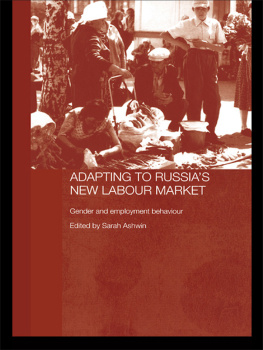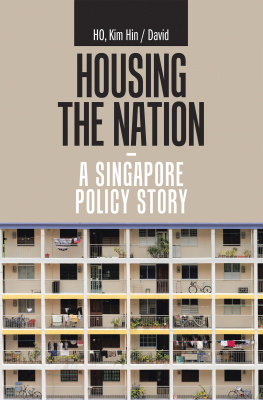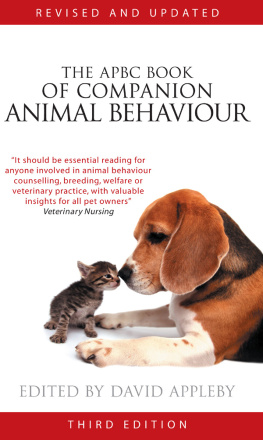First published 2000 by Ashgate Publishing
Reissued 2018 by Routledge
2 Park Square, Milton Park, Abingdon, Oxon 0X14 4RN
711 Third Avenue, New York, NY 10017, USA
Routledge is an imprint of the Taylor & Francis Group, an informa business
Copyright Jos van Ommeren 2000
All rights reserved. No part of this book may be reprinted or reproduced or utilised in any form or by any electronic, mechanical, or other means, now known or hereafter invented, including photocopying and recording, or in any information storage or retrieval system, without permission in writing from the publishers.
Notice:
Product or corporate names may be trademarks or registered trademarks, and are used only for identification and explanation without intent to infringe.
Publishers Note
The publisher has gone to great lengths to ensure the quality of this reprint but points out that some imperfections in the original copies may be apparent.
Disclaimer
The publisher has made every effort to trace copyright holders and welcomes correspondence from those they have been unable to contact.
A Library of Congress record exists under LC control number: 00132615
ISBN 13: 978-1-138-72627-7 (hbk)
ISBN 13: 978-1-315-19145-4 (ebk)
I wish gratefully to acknowledge the contribution of all those who were involved in my research on job mobility, residential mobility and commuting which is reported in this book: Cees Gorter, Gerard van den Berg, Giovanni Russo and Richard Emmerink, but in particular, Piet Rietveld and Peter Nijkamp.
I wish to thank also Sarah Atterbury and, in particular, Caroline Mahoney for all their work in the preparation of the book.
I would also like to express my thanks to the following publishers for their permission to use parts of the following articles:
Blackwell Publishers for van Ommeren J.N., P. Rietveld and P. Nijkamp (1998) Spatial Moving Behaviour of Two-Earner Households, Journal of Regional Science, 38, 1, 23-41.
The University of Wisconsin Press for van Ommeren J.N, (1988), On the Job Search Behaviour: The Importance of Commuting Time, Land Economics, 74, 4, 526-540.
Academic Press for van Ommeren J.N., P. Rietveld and P. Nijkamp (1997) Commuting: in Search of Jobs and Residences, Journal of Urban Economics, 42, 402-421 and for van Ommeren, J.N., P. Rietveld and P. Nijkamp (1999), Job Mobility, Residential and Commuting: a Search Perspective, Journal of Urban Economics, 46, 230-253.
Sage Periodicals Press for van Ommeren J.N., P. Rietveld and P. Nijkamp (1999), Impacts of Employed Spouses on Job Moving Behaviour, International Regional Science Review, 22, 1, 54-68.
Springer-Verlag for van Ommeren J.N., P. Rietveld and P. Nijkamp, Job Mobility, Residential and Commuting: a Theoretical Analysis Using Search Theory, Annals of Regional Science, forthcoming.
Relevance of the Subject
In the last century, and particularly during the last decades, many industrialised and developing countries have encountered strong and persistent growth in commuting. The consequences of this growth on society are far-reaching in terms of congestion and other external costs such as pollution and noise. The main explanation for this growth may be found in decreased costs of travel and faster modes of transport, but other factors may also have added to this growth (e.g. suburbanisation of the population in urban areas, labour specialisation). These current historically-low costs of travel, in terms of monetary expenses and time, have produced a wide variety of commuting behaviours. Commuters strongly differ from each other in many ways. First of all, commuters differ with respect to their mode of transport (Meurs, 1991); in the second place, commuters differ widely in their commuting time or commuting distance.
Several explanations have been offered to clarify the observed differences in commuting. These theories are based on the notion that the commuting journey allows persons to spatially link their workplace and residential location. For example, this has induced labour economists to presume that commuting costs are compensated for by higher wages (Cogan, 1981) and urban economists to presume that commuting costs are compensated for by lower housing prices (see the seminal contribution by Alonso, 1964). It has also been noticed that observed differences in the value attributed to time help to explain commuting behaviour which may depend on the household situation. So observed differences in commuting are generally interpreted as a sign that commuters vary with respect to their labour position, household situation, demand for housing, accessibility to different modes of transport, etc.
Although the observed differences in commuting are partially explained by the differences in the characteristics of commuters, a robust but striking result is that empirical studies fail to explain the major part of the observed differences in commuting (White, 1986). One explanation might be that many influential explanatory variables are excluded in the empirical analysis. A more satisfying interpretation is that due to market imperfections, workers do widely differ from each other with respect to commuting. Conventional urban economic models ignore the importance of market imperfections and have therefore, been severely criticised. For example, Hamilton (1982) suggests that a random matching of jobs and workers in urban areas is closer to the reality of urban commuting than the standard urban economic model with decentralised employment.
In this study, we will focus on two types of market imperfections which may have a significant influence on commuting behaviour: imperfect information and moving costs. Imperfect information is included within this study by assuming that jobs and residences are search goods. Workers search over job and residence opportunities and move from job to job, and from residence to residence. With moving costs, we refer to the monetary and nonmonetary costs due to moving residence or job.
In a hypothetical economy without market imperfections (perfect information, no moving costs), workers would adjust their residence or workplace location so that the costs due to commuting are fully compensated for (Alonso, 1964). In an economy with market imperfections this will rarely be the case (Weinberg, 1979; Zax, 1991; Hamilton, 1982, 1989; Rouwendal, 1994). As we wish to study the effect of market imperfections on commuting behaviour, we will focus in our study upon both the decision to move job and the decision to move residence. The decisions to move job and the decision to move residence are closely related dynamic discrete choices, as both moves involve a change of commuting costs. This means that labour and residential moving and commuting behaviour are mutually dependent and must ideally be analysed together, and based on a theory which incorporates these decisions explicitly. We have made this interdependency the core of our study.










